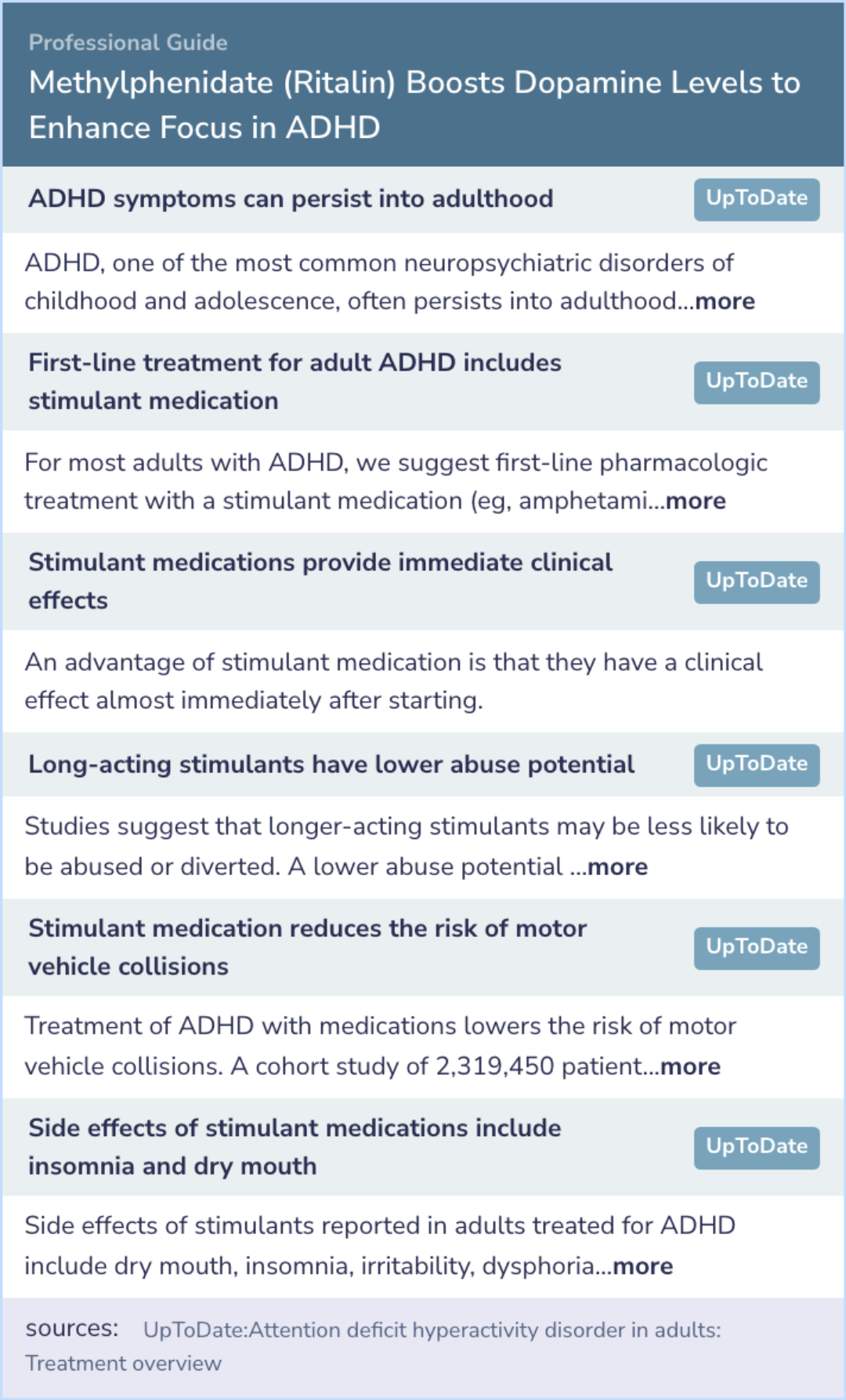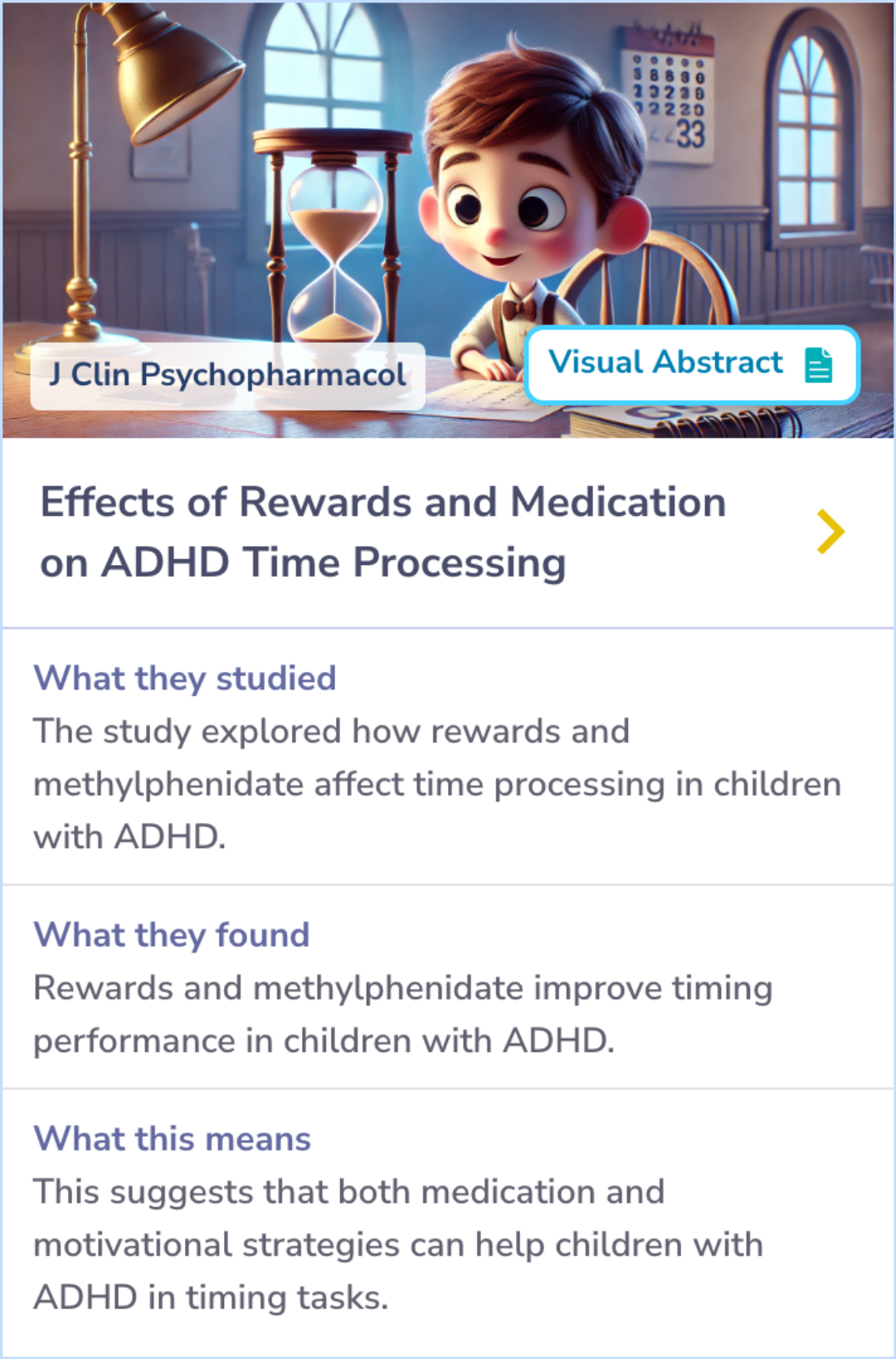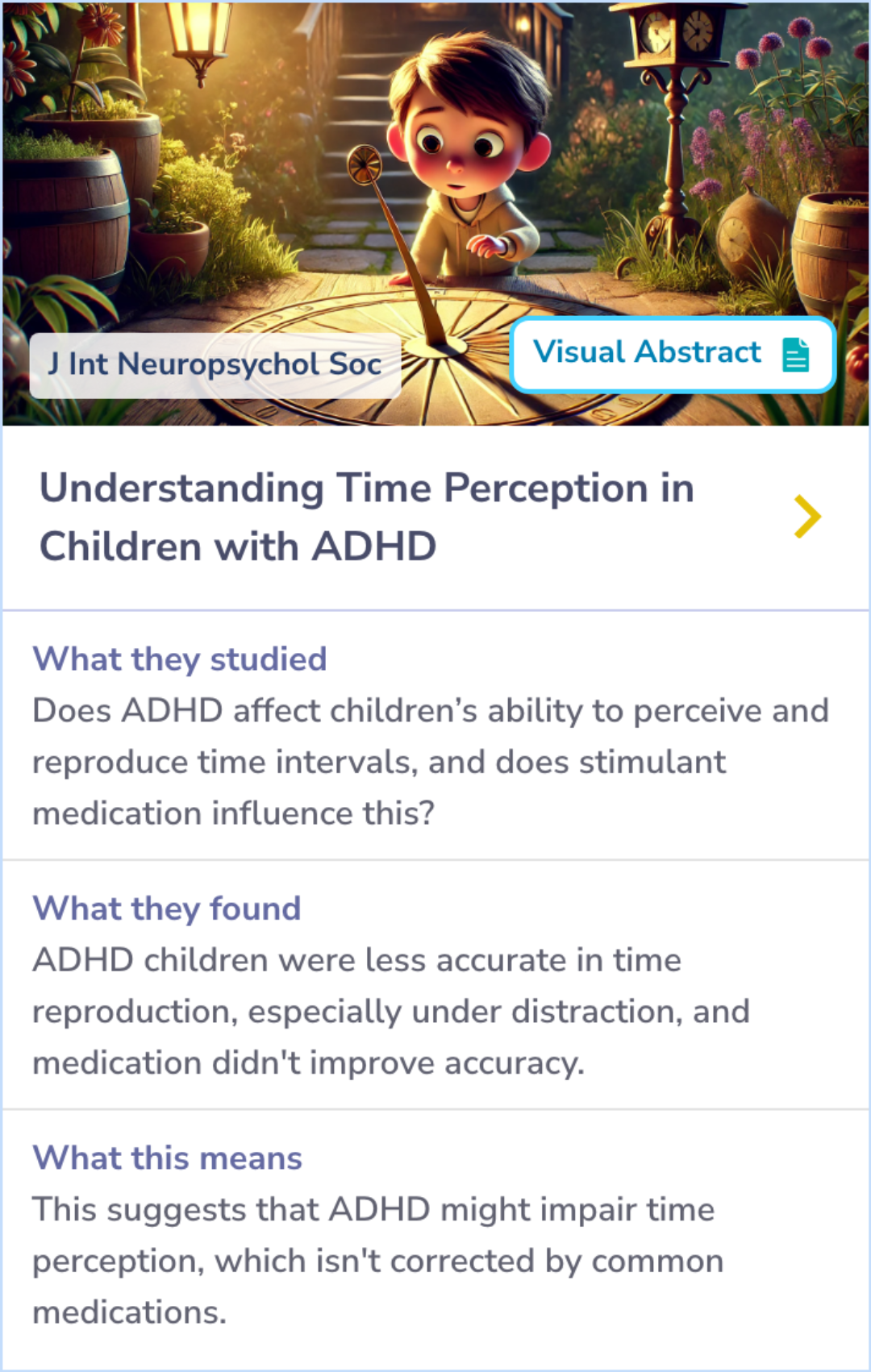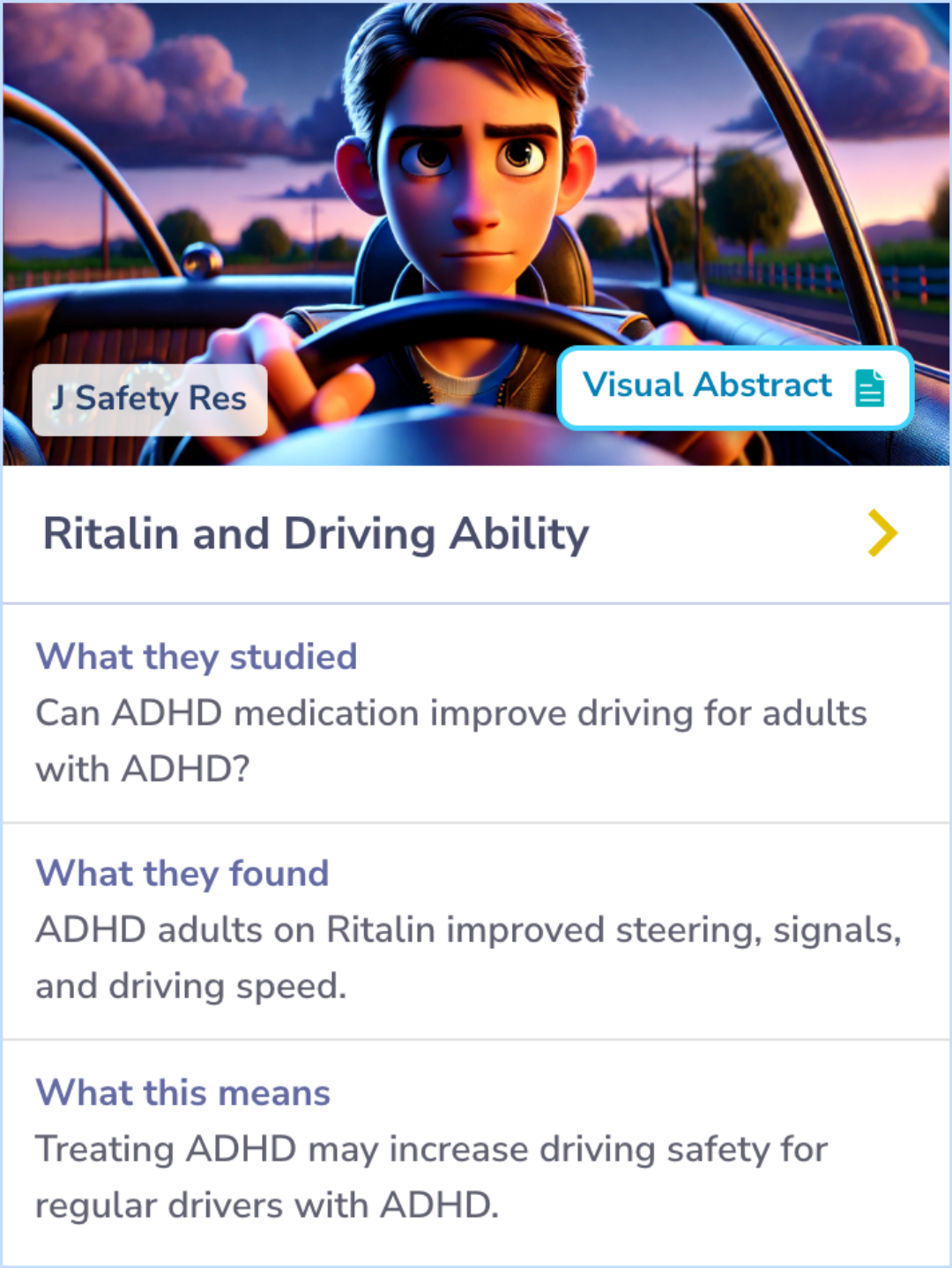Ritalin Paper Database
Visual Abstract
Therapeutic doses of oral methylphenidate significantly increase extracellular dopamine in the human brain.
Methylphenidate (Ritalin) Boosts Dopamine Levels to Enhance Focus in ADHD
October 18, 2024
author
Volkow ND, Wang G, Fowler JS, Logan J, Gerasimov M, Maynard L, Ding Y, Gatley SJ, Gifford A, Franceschi D
journal
J Neurosci
Date Published
2001 Jan 15
Why link to a visual abstract?
What is a visual abstract?
Original
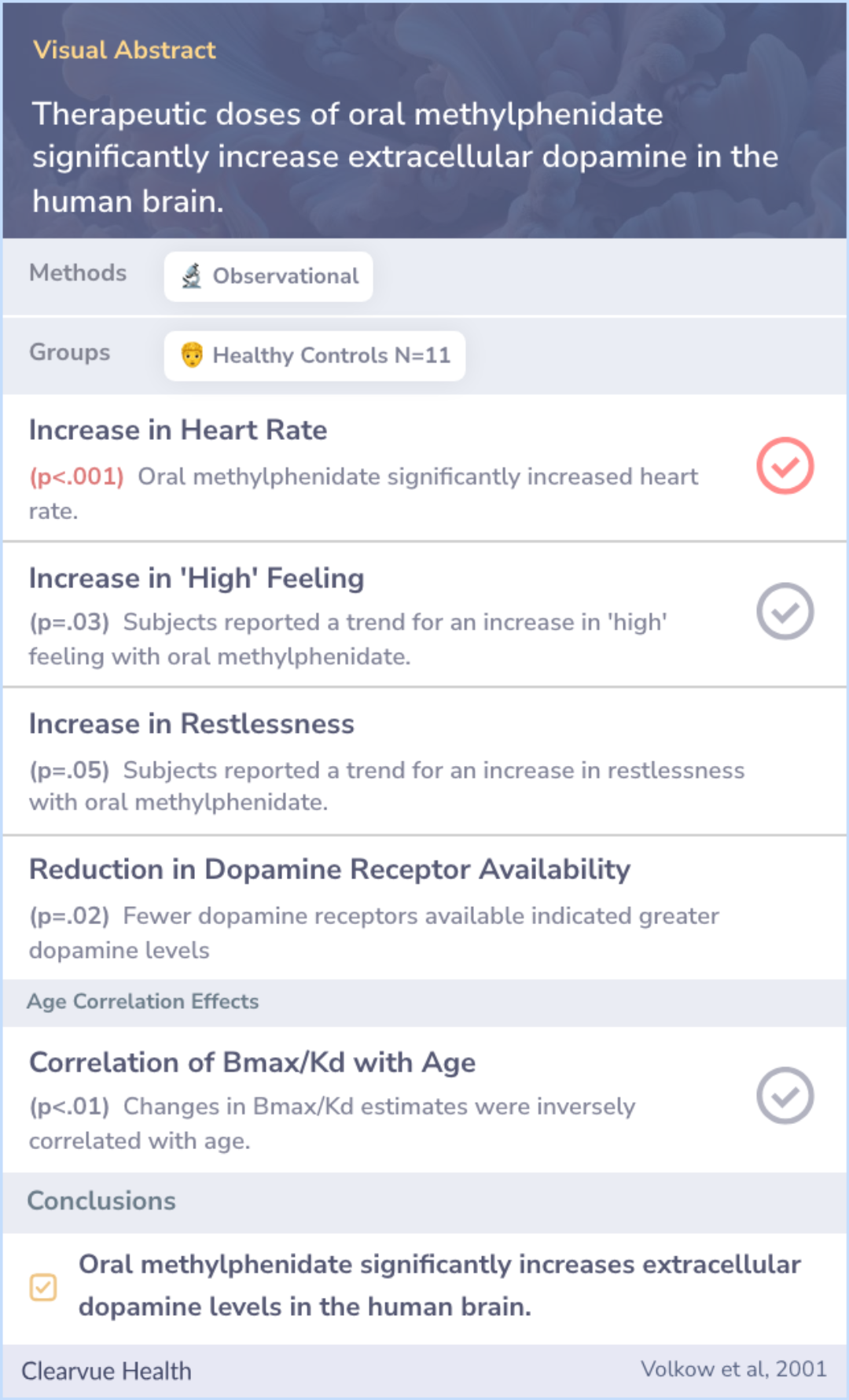
Study Summary
🔬
What They Studied
The researchers studied how oral methylphenidate (Ritalin) affects extracellular dopamine levels in the human brain.
💡
What They Found
They found that oral methylphenidate significantly increases extracellular dopamine levels in the brain.
📚
What This Means
These findings align with current evidence that methylphenidate (Ritalin) effectively enhances dopamine signaling, which helps improve attention and reduce distractibility in ADHD patients.
Study Summary
Study Overview
This study aimed to explore how oral methylphenidate, commonly known as Ritalin, influences dopamine levels in the human brain. Researchers were particularly interested in whether the drug, when taken in therapeutic doses, could significantly increase extracellular dopamine. Dopamine is a neurotransmitter that plays a crucial role in attention, motivation, and reward, making it a key target for ADHD treatments.
The findings from this research suggest that methylphenidate indeed boosts dopamine levels, particularly by blocking dopamine transporters, which normally remove dopamine from the brain's extracellular space. This increase in dopamine is thought to amplify weak signals in the brain, which could help improve attention and focus in individuals with ADHD. The study provides a clearer understanding of how methylphenidate works at a molecular level, supporting its effectiveness as a treatment for ADHD.
The findings from this research suggest that methylphenidate indeed boosts dopamine levels, particularly by blocking dopamine transporters, which normally remove dopamine from the brain's extracellular space. This increase in dopamine is thought to amplify weak signals in the brain, which could help improve attention and focus in individuals with ADHD. The study provides a clearer understanding of how methylphenidate works at a molecular level, supporting its effectiveness as a treatment for ADHD.
Abstract: background
Methylphenidate (Ritalin) is the most commonly prescribed psychoactive drug in children for the treatment of attention deficit hyperactivity disorder (ADHD), yet the mechanisms responsible for its therapeutic effects are poorly understood.

Methylphenidate Increases Dopamine
"These results provide direct evidence that oral methylphenidate at doses within the therapeutic range significantly increases extracellular dopamine in human brain."
Amplifies Dopamine Release
"Methylphenidate amplifies dopamine release resultant from dopamine cell firing, which in turn is responsive to environmental stimulation."
Correcting Dopamine Deficits
"Subjects with ADHD, in whom increased brain levels of dopamine transporters are likely to result in rapid removal of dopamine from the extracellular space, may exhibit deficits of dopamine that are corrected by treatment with methylphenidate."
Study Summary
Methods
The study focused on the effects of methylphenidate on dopamine levels in the brain. Methylphenidate blocks the dopamine transporter, which is responsible for removing dopamine from the brain, but it is uncertain if this leads to increased dopamine levels at therapeutic doses.
To investigate this, researchers used a brain imaging technique called positron emission tomography (PET) with a specific tracer to observe changes in dopamine levels in 11 healthy individuals after taking oral methylphenidate.
To investigate this, researchers used a brain imaging technique called positron emission tomography (PET) with a specific tracer to observe changes in dopamine levels in 11 healthy individuals after taking oral methylphenidate.
Abstract: methods
Whereas methylphenidate blocks the dopamine transporter (main mechanism for removal of extracellular dopamine), it is unclear whether at doses used therapeutically it significantly changes extracellular dopamine (DA) concentration. Here we used posit...more

Study Summary
Results
The findings showed that taking oral methylphenidate significantly raised dopamine levels in the brain. This was indicated by a notable reduction in receptor availability, suggesting that more dopamine was present in the striatum, a key area for processing rewards and motivation.
These results confirm that methylphenidate, at prescribed doses, effectively increases dopamine levels, shedding light on how it may help improve attention and reduce impulsivity in individuals with ADHD.
These results confirm that methylphenidate, at prescribed doses, effectively increases dopamine levels, shedding light on how it may help improve attention and reduce impulsivity in individuals with ADHD.
Abstract: results
We showed that oral methylphenidate (average dose 0.8 +/- 0.11 mg/kg) significantly increased extracellular DA in brain, as evidenced by a significant reduction in B(max)/K(d) (measure of D2 receptor availability) in striatum (20 +/- 12%; p < 0.0005)...more
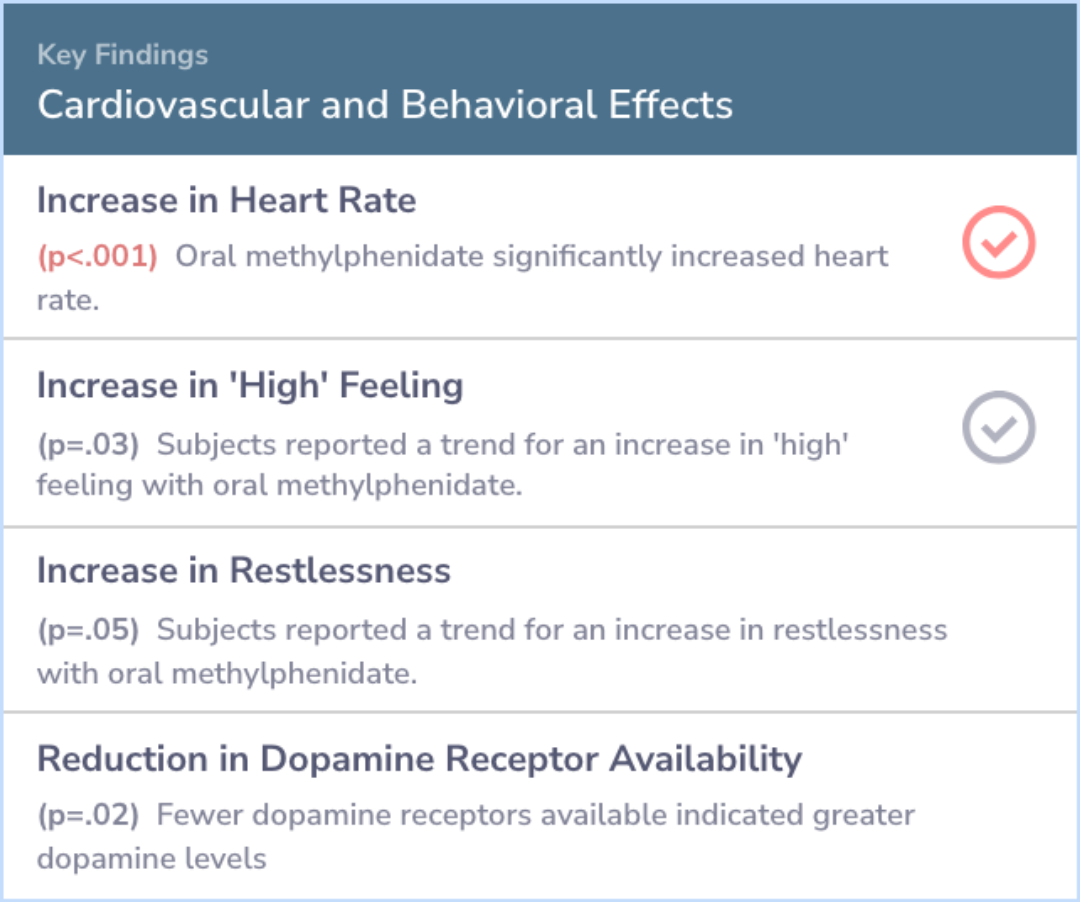

Study Summary
Conclusions
The study's results, along with previous findings on dopamine transporter levels in ADHD patients, provide insight into how methylphenidate works. The increase in dopamine from methylphenidate likely enhances the effects of naturally released dopamine, making it easier to focus and filter out distractions.
Additionally, since dopamine is linked to motivation and reward, the enhanced dopamine levels could make tasks more engaging, thus improving overall performance in individuals with ADHD.
Additionally, since dopamine is linked to motivation and reward, the enhanced dopamine levels could make tasks more engaging, thus improving overall performance in individuals with ADHD.
Abstract: conclusions
This result coupled with recent findings of increased dopamine transporters in ADHD patients (which is expected to result in reductions in extracellular DA) provides a mechanistic framework for the therapeutic efficacy of methylphenidate. The increas...more
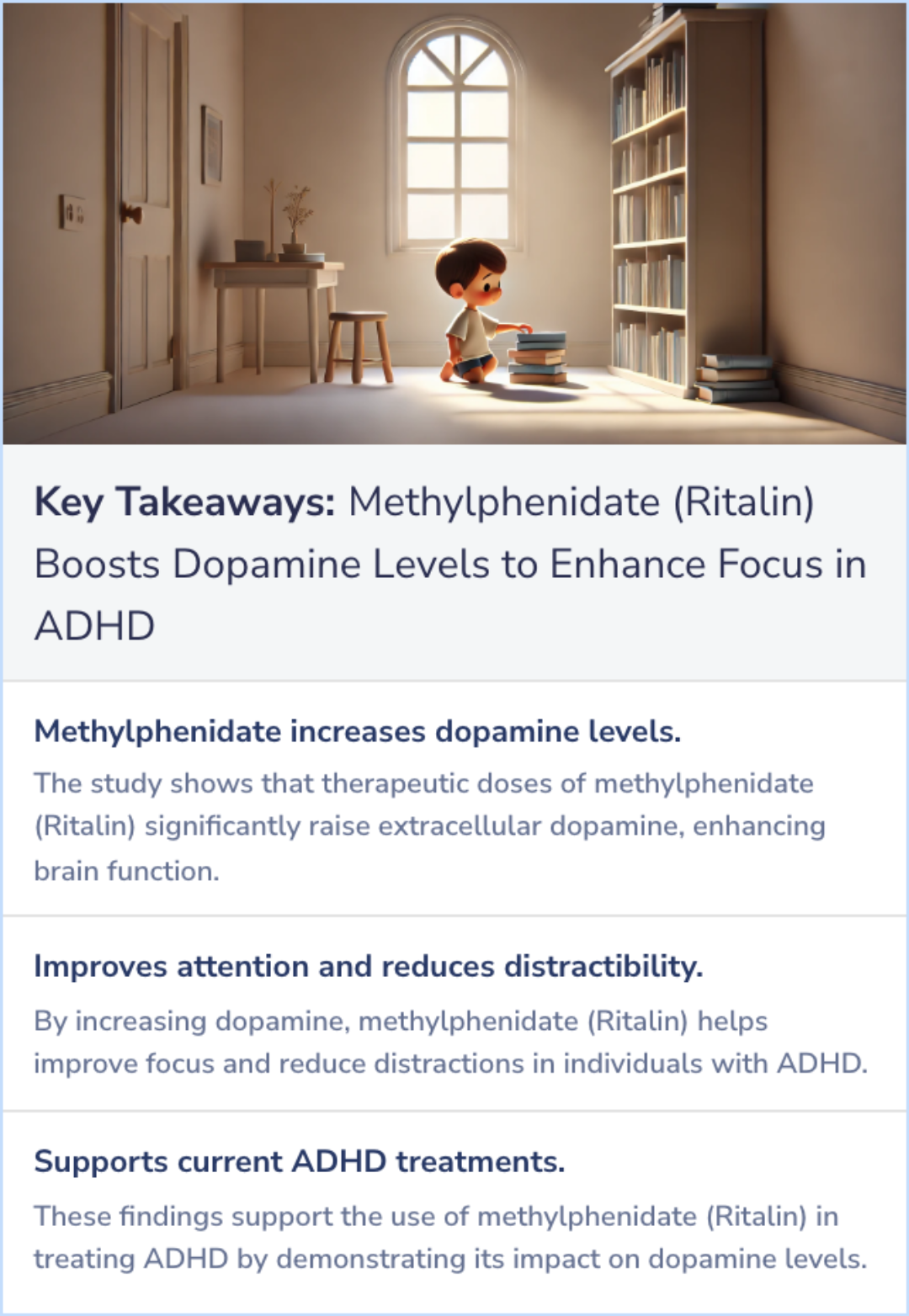
Background Information
Patient Guide
🧠
Mechanism of Action
Methylphenidate blocks the reuptake of norepinephrine and dopamine, boosting their concentration in the synaptic cleft.
👨⚕️
Therapeutic Uses
Methylphenidate is FDA-approved for treating ADHD in children over six and adults, and also for narcolepsy.
📏
Dose Management
Dosage of methylphenidate needs careful management to avoid exceeding the maximum daily dose of 72 mg for extended-release tablets.
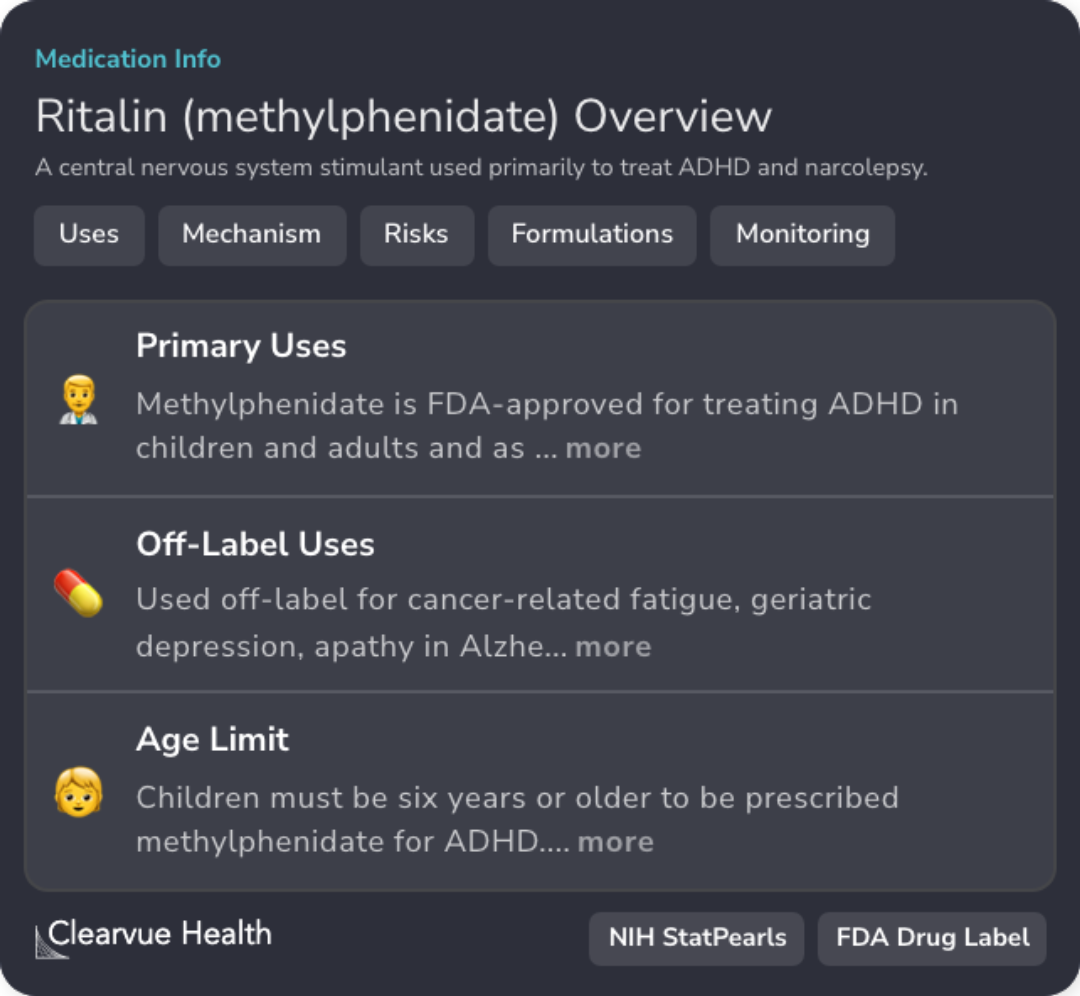
Professional Guide
Expert Opinion: Methylphenidate (Ritalin) Boosts Dopamine Levels to Enhance Focus in ADHD
Current professional recommendations suggest first-line pharmacologic treatment with stimulant medications like amphetamines or methylphenidate for adult ADHD patients.
An advantage of these stimulants is their immediate clinical effect, which can lead to rapid improvement in attention and daily functioning.
Although both amphetamines and methylphenidate are considered comparably efficacious, some data suggest amphetamines might be more beneficial for reducing core ADHD symptoms.
Studies also indicate that longer-acting stimulants have a lower potential for abuse compared to immediate-release versions.
Additionally, the use of stimulant medications not only improves symptomatic and functional outcomes but also reduces the risk of motor vehicle collisions in ADHD patients.
However, it is important to note that side effects such as insomnia, dry mouth, and potential misuse exist with stimulant treatment.
An advantage of these stimulants is their immediate clinical effect, which can lead to rapid improvement in attention and daily functioning.
Although both amphetamines and methylphenidate are considered comparably efficacious, some data suggest amphetamines might be more beneficial for reducing core ADHD symptoms.
Studies also indicate that longer-acting stimulants have a lower potential for abuse compared to immediate-release versions.
Additionally, the use of stimulant medications not only improves symptomatic and functional outcomes but also reduces the risk of motor vehicle collisions in ADHD patients.
However, it is important to note that side effects such as insomnia, dry mouth, and potential misuse exist with stimulant treatment.
Evidence Summary
Methylphenidate and Rewards in ADHD
Methylphenidate increases dopamine in the brain, as shown in the paper above.
This study examined how the drug and rewards affect time processing in ADHD children.
Both rewards and the drug improved their timing accuracy.
Interestingly, higher doses of methylphenidate had a larger effect, but did not enhance the effect of rewards.
These findings highlight how reinforcement and medication can improve cognitive performance in ADHD.
This study examined how the drug and rewards affect time processing in ADHD children.
Both rewards and the drug improved their timing accuracy.
Interestingly, higher doses of methylphenidate had a larger effect, but did not enhance the effect of rewards.
These findings highlight how reinforcement and medication can improve cognitive performance in ADHD.
Evidence Summary
ADHD, Time Perception, and Medication Effects
A recent theory predicts ADHD affects children's sense of time.
Studies showed ADHD children struggle to accurately reproduce time intervals, especially when distracted.
Control subjects remained accurate regardless of distraction.
Stimulant medication like methylphenidate didn't improve the accuracy in ADHD children, even at different doses.
This aligns with findings that while methylphenidate increases dopamine, it may not enhance certain cognitive functions in ADHD.
Studies showed ADHD children struggle to accurately reproduce time intervals, especially when distracted.
Control subjects remained accurate regardless of distraction.
Stimulant medication like methylphenidate didn't improve the accuracy in ADHD children, even at different doses.
This aligns with findings that while methylphenidate increases dopamine, it may not enhance certain cognitive functions in ADHD.
Evidence Summary
Methylphenidate's Impact on ADHD and Driving Performance
In the paper above, oral methylphenidate significantly increased extracellular dopamine in the brain.
This addresses a mechanistic perspective on its effects.
Expanding this, a study examined how methylphenidate (at doses of 10 and 20 mg) impacts driving performance in adults with ADHD.
Higher doses improved impulsiveness, steering variability, and speed, highlighting its broader applications beyond attention improvement.
This addresses a mechanistic perspective on its effects.
Expanding this, a study examined how methylphenidate (at doses of 10 and 20 mg) impacts driving performance in adults with ADHD.
Higher doses improved impulsiveness, steering variability, and speed, highlighting its broader applications beyond attention improvement.
